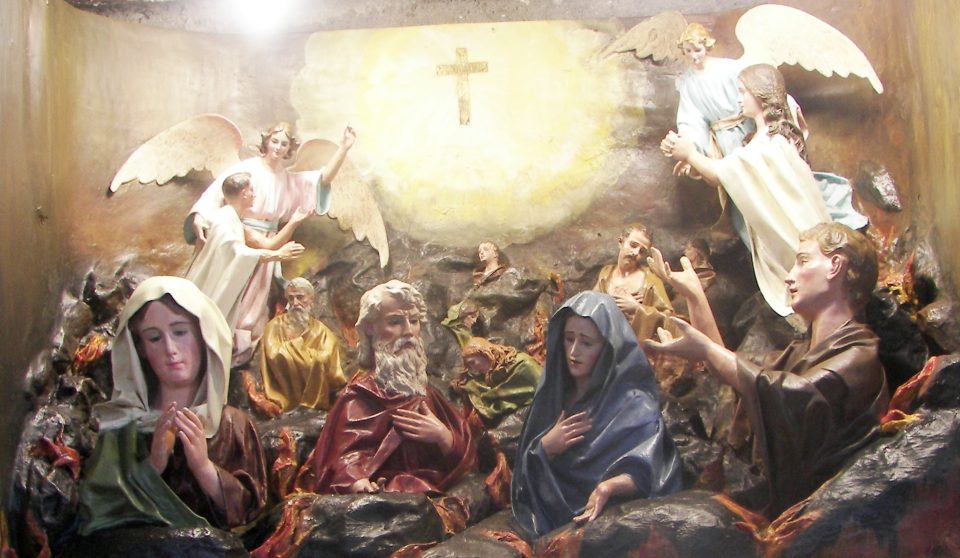Is Purgatory a Catholic "invention"?

Fundamentalists might like to say that the Catholic Church "invented" the doctrine of purgatory to make money, but they have a hard time saying just when. Most professional anti-Catholics - those who make a living by attacking "Romanism" - seem to blame Pope Gregory the Great, who reigned from 590 to 604 AD
But this hardly explains the request of Monica, Augustine's mother, who in the fourth century asked her son to remember his soul in his Masses. This would not make sense if he thought that his soul would not benefit from prayers, as it would be in hell or in the full glory of heaven.
Nor does attributing the doctrine to Gregory explain the graffiti in the catacombs, where Christians during the persecutions of the first three centuries recorded prayers for the dead. Indeed, some of the early Christian writings outside the New Testament, such as the Acts of Paul and Tecla and the Martyrdom of Perpetua and Felicity (both written during the second century), refer to the Christian practice of praying for the dead. Such prayers would have been offered only if Christians believed in purgatory, even if they had not used that name for this. (See Catholic Answers' The Roots of Purgatory treatise for quotes from these and other early Christian sources.)
"The purgatory in the scriptures"
Some fundamentalists also argue that "the word purgatory is not found anywhere in the scriptures." This is true, yet it does not refute the existence of purgatory or the fact that belief in it has always been part of the teaching of the Church. The words Trinity and Incarnation are not even in Scripture, yet those doctrines are clearly taught in it. Likewise, Scripture teaches that purgatory exists, even if it does not use that word and even if 1 Peter 3:19 refers to a place other than purgatory.
Christ refers to the sinner who "will not be forgiven, neither in this age nor in the era to come" (Matt. 12:32), suggesting that one can be freed after the death of the consequences of one's sins. Likewise, Paul tells us that when we are judged, every man's work will be tried. And what if a righteous man's job fails the test? "He will suffer the loss, even if he himself is saved, but only through fire" (1 Cor 3:15). Now this loss, this penalty, cannot refer to the expedition to hell, since nobody is saved there; and heaven cannot be understood, since there is no suffering ("fire") there. The Catholic doctrine of purgatory alone explains this passage.
Then, of course, there is the biblical approval of prayers for the dead: “In doing this he acted in a very excellent and noble way, in that he had in view the resurrection of the dead; because if he did not expect the dead to rise again, it would have been useless and foolish to pray for them in death. But if he did so in view of the splendid reward that awaits those who had gone to rest in pity, it was a holy and pious thought. So he made atonement for the dead so that they could be freed from this sin "(2 Macc. 12: 43–45). Prayers are not necessary for those in heaven and nobody can help those in hell. This verse illustrates so clearly the existence of purgatory that, at the time of the Reformation, Protestants had to cut out the books of the Maccabees from their Bibles to avoid accepting the doctrine.
The prayers for the dead and the consequent doctrine of purgatory have been part of true religion since before the time of Christ. Not only can we prove that it was practiced by the Jews at the time of the Maccabees, but it was even held back by the Orthodox Jews today, who recite a prayer known as Mourner's Kaddish for eleven months after the death of a loved one so that the loved one can be purified. It was not the Catholic Church that added the doctrine of purgatory. Rather, Protestant churches rejected a doctrine that had always been believed by Jews and Christians.
Why go to purgatory?
Why would anyone go to purgatory? To be purified, because "nothing unclean must enter [in heaven]" (Revelation 21:27). Anyone who has not been completely freed from sin and its effects is, to some extent, "unclean". Through repentance he may have obtained the grace necessary to be worthy of heaven, that is, he has been forgiven and his soul is spiritually alive. But this is not enough to gain entry to heaven. It must be completely clean.
Fundamentalists claim, as an article in Jimmy Swaggart's magazine, The Evangelist, states that “Scripture clearly reveals that all the demands of divine justice on the sinner have been completely met in Jesus Christ. It also reveals that Christ totally redeemed or repurchased what was lost. Proponents of purgatory (and the need for prayer for the dead) say, in effect, that Christ's redemption was incomplete. . . . Everything was done for us by Jesus Christ, there is nothing to add or do by man ”.
It is entirely correct to say that Christ accomplished all our salvation for us on the cross. But this does not resolve the question of how this redemption is applied to us. Scripture reveals that it is applied to us over time through, among other things, the process of sanctification through which the Christian is made holy. Sanctification involves suffering (Rom. 5: 3–5) and purgatory is the final stage of sanctification that some of us must undergo before entering heaven. Purgatory is the final phase of the application of Christ to us for the purifying redemption that he accomplished for us with his death on the cross